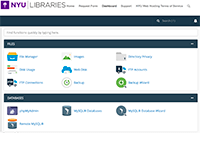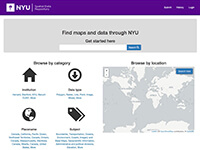Digital Scholarship Services (DSS)
Established in 2013
http://library.nyu.edu/departments/digital-scholarship-services/
Staff: 2 + 6 affiliated staff from other units

The Digital Scholarship Services (DSS) department, housed within New York University’s (NYU) Division of Libraries’ Elmer Holmes Bobst Library, offers supports that span everything from repository services, digital publishing, and website creation and hosting to digital humanities tools and methods, copyright and fair use expertise, and digital scholarship workshops. DSS started out as a relatively small unit in 2013; two years later, its official launch as a department was announced to the NYU community. The DSS website describes the department’s mission in this way: “We help NYU faculty and students incorporate digital scholarship tools and methods into their research and teaching. We help you to plan, analyze, visualize, store, share, and publish your digital projects.” The use of the term “services” within Digital Scholarship Services is deliberate; DSS is not a self-standing center with dedicated space. Rather, DSS partners with a number of affiliated departments such as Data Services, Digital Studio, and Digital Library Technology Services in order to offer the broad array of services described above.
ARL spoke with Zach Coble, head of Digital Scholarship Services. He explained that an extensive amount of research was carried out before the final organizational structure of DSS was determined. Dean of NYU Libraries, Carol Mandel, asked that an analysis be conducted that would (a) define NYU scholars’ needs, (b) determine how other research libraries were approaching this arena, and (c) propose a possible service model for the NYU Libraries to assess and potentially implement. Jennifer Vinopal, former head of DSS, and Monica McCormick, program officer for digital scholarly publishing at NYU, completed that analysis and shared their findings in “Supporting Digital Scholarship in Research Libraries: Scalability and Sustainability.”1

In addition to Coble and McCormick, who holds a joint appointment with the NYU Libraries and NYU Press, the DSS staff complement draws upon six individuals who are integral to the functioning of the unit. These staff are the digital scholarship librarian, scholarly communications librarian, the librarian for English and comparative literature, the research data management librarian, a data services specialist, and a software development and IT operations engineer. When considering those who reside in affiliated departments, the total number of staff who are involved with DSS in some way would number eight. That number does not include the many liaison/subject librarians who play a crucial role, facilitating connections between DSS and the faculty and students in their respective disciplines. Given the plethora of services offered by DSS and their affiliates, the organization relies upon an effective network of referrals to ensure that faculty and students are connected with the appropriate experts. These referrals may lead to more in-depth consultations. Coble notes that project-planning support for faculty is consistently in demand.
One initiative in particular helped inform the DSS service model: to identify emerging needs and expand services to meet those needs in a scalable way. In the first year or two of the unit’s existence, the team documented researcher requests that the service was not yet able to meet. The most frequent unmet need was for server space, either to host particular kinds of software (such as Omeka, for creating digital exhibits), or to provide scholars and students with a kind of sandbox space where they could learn to install and configure software, build databases, and so on. To meet this need, DSS piloted a Web Hosting service. They partnered with a service called Reclaim Hosting, which provides the server space and enables log-in with NYU’s NetIDs. Frequently requested tools—including Omeka, WordPress, and Scalar—can be provided to users with a single click. The DSS support role is to answer basic setup questions and provide consultation on project options, but not to work directly on users’ sites. The pilot has been very successful, with more than 100 users enrolled, in a way that the small DSS team can manage. Based on that experience, the team is in the process of rolling out a more permanent web hosting service.

While the majority of DSS activity is embedded in the research sphere, Coble anticipates that support for digital scholarship in the teaching and learning realm will be a growth area going forward. He cites the case of a nine-part series of digital humanities tools and methods workshops geared to graduate students that DSS held in the summer of 2015. The workshops covered such topics as computational thinking, GIS, text analysis, copyright, project management, and web publishing. (Coble adds that DSS has offered similar workshops to a number of departments on campus, customized to suit unique needs.) That series was made possible by Polonsky Foundation funding, as was a public lecture series offered by DSS in the spring of that same year. Experts from around the US, including Mark Algee-Hewitt, Jennifer Giuliano, Molly O’Hagan Hardy, and Miriam Posner, were invited to give public talks on their research.
One significant challenge facing DSS pertains to identity and branding. DSS frequently collaborates with several other departments whose work involves digital scholarship to varying degrees. This presents unique opportunities to leverage resources but also the possibility that patrons are not sure where to address questions. As DSS grows, it will continue to develop a distinct suite of services while ensuring smooth handoffs to its sister departments when needed.
Featured ProjectsWeb Hosting
Spatial Data Repository
Displaced Historieshttp://displacedhistories.hosting.nyu.edu/courses/spring2016/
|
Conclusion
The 2013 Vinopal/McCormick article continues to be an invaluable resource that identifies challenges facing a research library when navigating the digital scholarship landscape. The authors remind us:
This requires not just a onetime organizational change, but also the development of an organizational culture that is inquisitive, adaptable, responsive, and that welcomes change, one that is willing to try new things, assess their success, and sometimes simply move on. As new opportunities, roles, and responsibilities emerge, library leadership must take an active role in articulating a strategic vision, defining priorities, addressing the connections between new services and established ones, facilitating horizontal as well as vertical communication and collaboration, and building a staff that are lifelong learners with evolving job descriptions. Our success in supporting new scholarly practices hinges on our ability to scale and sustain this kind of organizational change.
Note
1. Jennifer Vinopal and Monica McCormick, “Supporting Digital Scholarship in Research Libraries: Scalability and Sustainability,” Journal of Library Administration 53, no. 1 (January 2013): 27–42, doi:10.1080/01930826.2013.756689, open access version available at https://archive.nyu.edu/handle/2451/31698.
Catherine Davidson | digschol@arl.org | April 27, 2017





